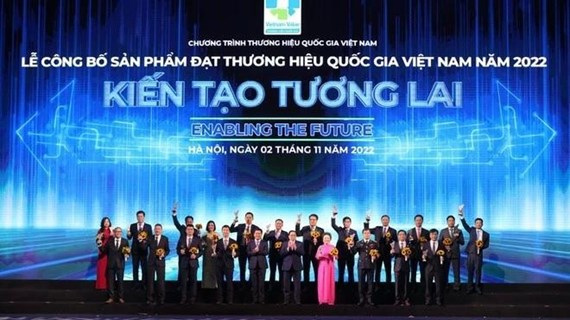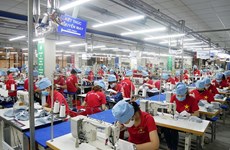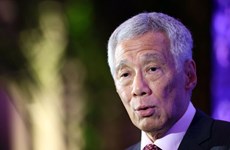ASEAN determined to overcome economic crisis
ASEAN Economic Community (AEC) Council
adopted a draft declaration on economic recovery and sustainable
development initiated by Vietnam at its third meeting in Hanoi on
April 7.
ASEAN Economic Community (AEC) Council
adopted a draft declaration on economic recovery and sustainable
development initiated by Vietnam at its third meeting in Hanoi on
April 7.
The document, to be submitted to the 16th ASEAN Summit, reiterates the bloc’s determination to overcome the negative impacts of the global economic crisis to maintain regional growth.
Addressing the function, AEC Chairman, Vietnamese Minister of Industry and Trade Vu Huy Hoang stressed the necessity of boosting linkage and cooperation among ASEAN members in the economic sector.
He also said that 2010 is an important year for the implementation of free trade liberalisation.
The third meeting of the AEC Council aims to review and evaluate the implementation of the ASEAN Economic Community Blueprint based on four main pillars: developing a single market and production base, becoming a highly competitive economic region, equal development across the region, and full integration into the world economy in 2015.
According to the Vietnamese head delegate, Deputy Minister of Industry and Trade Nguyen Cam Tu, ASEAN has made significant progress on the implementation of the AEC since it was endorsed in 2007.
As of January 1 this year, ASEAN-6 achieved full liberalisation of 99.65 percent of the total tariff lines and CLMV countries ( Cambodia , Laos , Myanmar and Viet Nam ) had already established 98.86 percent of their total tariff lines at 0-5 percent under the Common Effective Preferential Tariffs for ASEAN Free Trade Area (CEPT-AFTA).
“This is the most prominent outcome and important landmark for ASEAN,” said Tu.
January 1 was also the date when ASEAN saw the realisation of its FTAs with China and the Republic of Korea , as well as the entry into force of the ASEAN-Australia-New Zealand FTA and the ASEAN-India Trade in Goods Agreement.
With respect to trade in services, nine member countries (except the Philippines) have completed the 7th Package on service commitments under the ASEAN Framework Agreement on Trade in Services (AFAS), which covers more than 65 services sub-sectors.
In investment, ASEAN continues to experience steady growth in intra-regional FDI. In 2008, intra-ASEAN FDI flows reached 10.8 billion USD, accounting for 18.2 percent of the total FDI flows into the region (59.7 billion USD).
In the financial sector, the enlarged 120 billion USD swap arrangement under the Chiang Mai Initiative Multilateralisation (CMIM) was put into operation on March 24. The establishment of the Credit Guarantee and Investment Facility (CGIF) is expected to be realised soon and this will help increase the liquidity of local currency and develop regional bond markets.
In tourism cooperation, Mutual Recognition Arrangements (MRAs) on facilitating the mobility of tourist guides within the region, and a common set of competency standards for tourist guides in ASEAN have been developed.
In food security, ASEAN has established its Integrated Food Security Framework and a medium-term Strategic Plan of Action on Food Security.
In the energy sector, the Petroleum Security Agreement has been signed to minimise risks and to respond effectively in emergencies.
In the transportation sector, the Multilateral Agreement on Air Services and the Multilateral Agreement on the Full Liberalisation of Air Freight Services have been signed to provide for the creation of a single aviation market in ASEAN. The Framework Agreement on the Facilitation of Inter-State Transport is expected to further strengthen the transport facilitation and logistics environment.
In spite of its many achievements, ASEAN still needs to overcome some shortcomings, including the slow pace of the ratification of signed treaties and commitments, as well as that of bringing such commitments into domestic law, Tu said.
To solve these problems, the AEC Council seeks guidance from the leaders and their intervention in the timely ratification and implementation of signed agreements and enhancing the implementation of measures under the AEC Blueprint.
Tu further said that t he key deliverables for the AEC Council from now to the end of 2010 comprise implementing the Agreement on Trade in Goods of ASEAN (ATIGA), the ASEAN Comprehensive Investment Agreement (ACIA), and the Chiang Mai Initiative Multilateralisation.
AEC Council will also complete the eighth package of services committed under the Framework Agreement on Trade in Services; implement capacity-building programmes in the area of trade in services; promote the implementation of competition policy and consumer protection; cooperate on the protection of intellectual property; develop infrastructure and small- and medium-sized enterprises; and narrow the development gap./.
The document, to be submitted to the 16th ASEAN Summit, reiterates the bloc’s determination to overcome the negative impacts of the global economic crisis to maintain regional growth.
Addressing the function, AEC Chairman, Vietnamese Minister of Industry and Trade Vu Huy Hoang stressed the necessity of boosting linkage and cooperation among ASEAN members in the economic sector.
He also said that 2010 is an important year for the implementation of free trade liberalisation.
The third meeting of the AEC Council aims to review and evaluate the implementation of the ASEAN Economic Community Blueprint based on four main pillars: developing a single market and production base, becoming a highly competitive economic region, equal development across the region, and full integration into the world economy in 2015.
According to the Vietnamese head delegate, Deputy Minister of Industry and Trade Nguyen Cam Tu, ASEAN has made significant progress on the implementation of the AEC since it was endorsed in 2007.
As of January 1 this year, ASEAN-6 achieved full liberalisation of 99.65 percent of the total tariff lines and CLMV countries ( Cambodia , Laos , Myanmar and Viet Nam ) had already established 98.86 percent of their total tariff lines at 0-5 percent under the Common Effective Preferential Tariffs for ASEAN Free Trade Area (CEPT-AFTA).
“This is the most prominent outcome and important landmark for ASEAN,” said Tu.
January 1 was also the date when ASEAN saw the realisation of its FTAs with China and the Republic of Korea , as well as the entry into force of the ASEAN-Australia-New Zealand FTA and the ASEAN-India Trade in Goods Agreement.
With respect to trade in services, nine member countries (except the Philippines) have completed the 7th Package on service commitments under the ASEAN Framework Agreement on Trade in Services (AFAS), which covers more than 65 services sub-sectors.
In investment, ASEAN continues to experience steady growth in intra-regional FDI. In 2008, intra-ASEAN FDI flows reached 10.8 billion USD, accounting for 18.2 percent of the total FDI flows into the region (59.7 billion USD).
In the financial sector, the enlarged 120 billion USD swap arrangement under the Chiang Mai Initiative Multilateralisation (CMIM) was put into operation on March 24. The establishment of the Credit Guarantee and Investment Facility (CGIF) is expected to be realised soon and this will help increase the liquidity of local currency and develop regional bond markets.
In tourism cooperation, Mutual Recognition Arrangements (MRAs) on facilitating the mobility of tourist guides within the region, and a common set of competency standards for tourist guides in ASEAN have been developed.
In food security, ASEAN has established its Integrated Food Security Framework and a medium-term Strategic Plan of Action on Food Security.
In the energy sector, the Petroleum Security Agreement has been signed to minimise risks and to respond effectively in emergencies.
In the transportation sector, the Multilateral Agreement on Air Services and the Multilateral Agreement on the Full Liberalisation of Air Freight Services have been signed to provide for the creation of a single aviation market in ASEAN. The Framework Agreement on the Facilitation of Inter-State Transport is expected to further strengthen the transport facilitation and logistics environment.
In spite of its many achievements, ASEAN still needs to overcome some shortcomings, including the slow pace of the ratification of signed treaties and commitments, as well as that of bringing such commitments into domestic law, Tu said.
To solve these problems, the AEC Council seeks guidance from the leaders and their intervention in the timely ratification and implementation of signed agreements and enhancing the implementation of measures under the AEC Blueprint.
Tu further said that t he key deliverables for the AEC Council from now to the end of 2010 comprise implementing the Agreement on Trade in Goods of ASEAN (ATIGA), the ASEAN Comprehensive Investment Agreement (ACIA), and the Chiang Mai Initiative Multilateralisation.
AEC Council will also complete the eighth package of services committed under the Framework Agreement on Trade in Services; implement capacity-building programmes in the area of trade in services; promote the implementation of competition policy and consumer protection; cooperate on the protection of intellectual property; develop infrastructure and small- and medium-sized enterprises; and narrow the development gap./.











